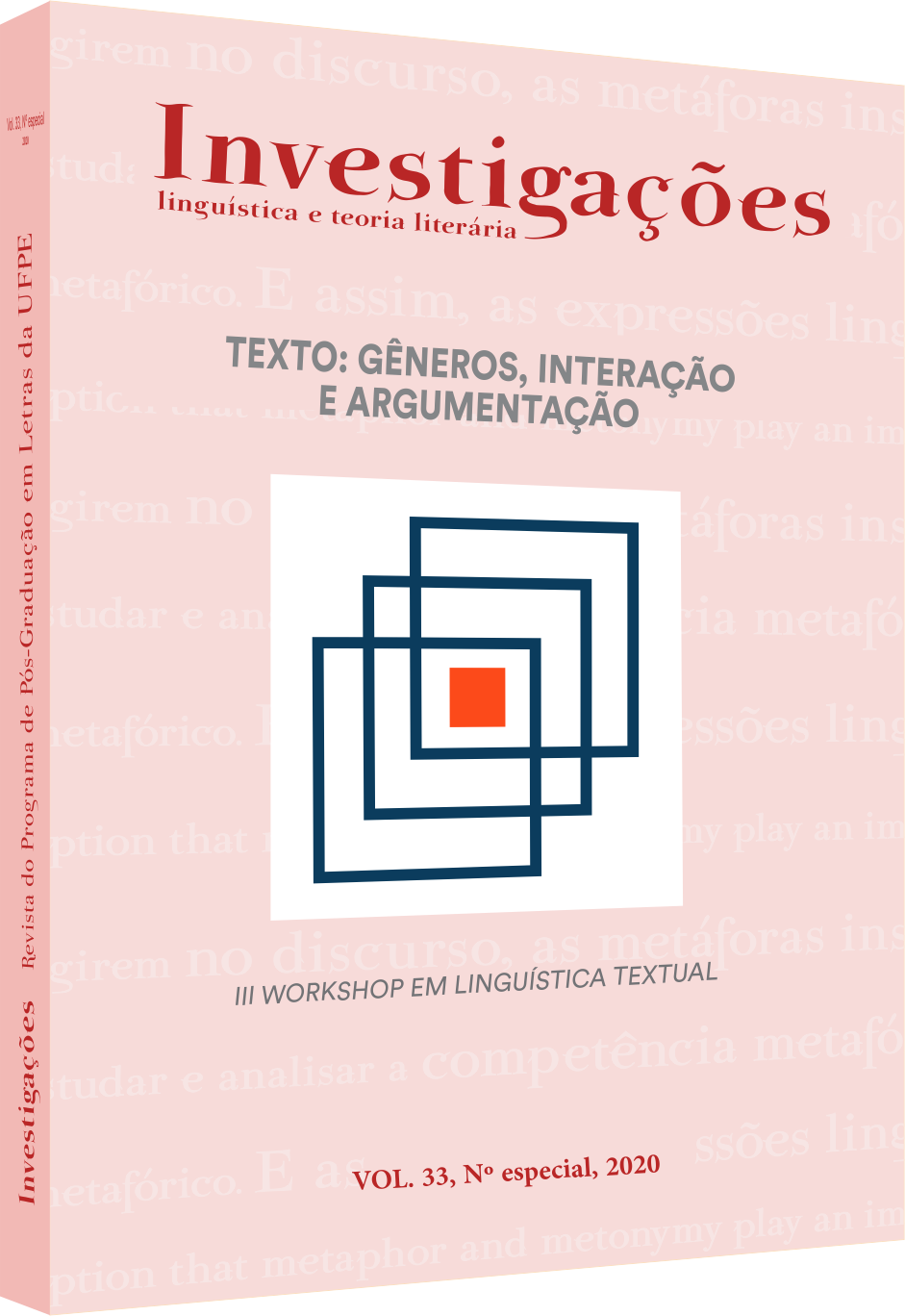Heterogeneidades enunciativas como estratégias argumentativas no Twitter
DOI:
https://doi.org/10.51359/2175-294x.2020.247007Keywords:
text linguistics, enunciative heterogeneities, argumentation.Abstract
In this work, we analyze the argumentative strategies performed by markers of enunciative heterogeneity within the social networking site Twitter. With this purpose, weargue fora theoretical interface between the fundamental assumptions of Text Linguistics and the theoretical framework of Linguistics of Enunciation, by Authier-Revuz (1990, 1998, 1999, 2004, 2008, 2015). By inscribing the subjectivity of the speaker in theirs speech through the representation of themselves and others in the discursive linearity, we hypothesize that these markers canprompt thestand taking in relation to thespeaker’sown speech as well as others’, working as argumentative strategies in the texts.References
AUTHIER-REVUZ, Jacqueline. Algumas considerações sobre modalização autonímica e discurso outro. Letras de Hoje, Porto Alegre, v. 34, n. 2, ed. 116, p. 7-30, 1999.
AUTHIER-REVUZ, Jacqueline. A representação do discurso outro: um campo multiplamente heterogêneo. Revista Investigações, Recife, v. 28, n. Especial, p. 1-39, 2015. Disponível em: https://periodicos.ufpe.br/revistas/INV/article/view/1846/1460. Acesso em: 18 jul. 2019.
AUTHIER-REVUZ, Jacqueline. Entre a transparência e a opacidade: um estudo enunciativo do sentido. Porto Alegre: EDIPUCRS, 2004.
AUTHIER-REVUZ, Jacqueline. Heterogeneidade(s) Enunciativa(s). Caderno de Estudos Linguísticos, Campinas, v. 19, p. 25-42, 1990.
AUTHIER-REVUZ, Jacqueline. O estrato meta-enunciativo, lugar de inscrição do sujeito em seu dizer: implicações teóricas e descritivas de uma abordagem literal. O exemplo das modalidades irrealizantes do dizer. Tradução de Maria Cristina Batalha. Matraga, Rio de Janeiro, v. 15, n. 22, p. 33-63, 2008. Disponível em: https://www.e-publicacoes.uerj.br/index.php/matraga/article/view/27906/0. Acesso em: 18 jul. 2019.
AUTHIER-REVUZ, Jacqueline. Palavras incertas: as não-coincidências do dizer. Campinas: Editora da Unicamp, 1998.
AUTHIER-REVUZ, Jacqueline. Representação do discurso outro e categorização metalinguageira. Tradução de Dóris de Arruda C. da Cunha e Joice Armani Galli. In: CUNHA, Dóris de Arruda C. da Cunha; GRIGOLETTO, Evandra; Cortez, Suzana Leite (Orgs.) Representação dos dizeres na construção dos discursos. Campinas: Pontes Editores, 2018. p. 17-36.
BOLSONARO confessa que era o mais ruim. [S. l.]: Tv Afiada, 2019. Disponível em: www.youtube.com/watch?v=3jxYQxJXfM8. Acesso em: 12 mar. 2020.
BRITO, Mariza Angélica Paiva. Marcas linguísticas da interpretação psicanalítica: heterogeneidades enunciativas e construção da referência. 2010. 213 f. Tese (Doutorado em Linguística) – Universidade Federal do Ceará, Fortaleza, 2010. Disponível em: http://www.repositorio.ufc.br/bitstream/riufc/8892/1/2010_tese_mapbrito.pdf. Acesso em: 18 jul. 2019.
BRITO, Mariza Angélica Paiva; FALCÃO, Maria Dayanne Sampaio; SANTOS, José Elderson Souza. Apelo a um exterior: as alusões como estratégias argumentativas. Revista de Letras, Centro de Humanidades, Universidade Federal do Ceará, v. 2, n. 36, p. 23-35, 2018.
BRITO, Mariza Angélica Paiva; CABRAL, Ályna Maria Fragoso; MORAIS, José Edileudo da Silva. O uso das aspas como recurso argumentativo - o apelo à voz do outro. PERcursos Linguísticos, Vitória. v. 7, n. 17, p. 105-120, 2017.
BRITO, Mariza Angélica Paiva; PINHEIRO, Carlos Eduardo Silva. O estatuto argumentativo das não coincidências do dizer. In: AZEVEDO, Isabel Cristina Michelan de; PIRIS, Eduardo Lopes. (Orgs.). Discurso e Argumentação: fotografias interdisciplinares. vol. 2. 1 ed. Coimbra: Grácio Editor, 2018. p. 173-188.
CAVALCANTE, Mônica Magalhães; FONSECA, Carlos Magno Viana. Linguística Textual e Teoria da Enunciação. In: SOUZA, Edson Rosa Francisco de; PENHAVEL, Eduardo; CINTRA, Marcos Rogério. (Orgs.). Linguística Textual: interfaces e delimitações. São Paulo: Cortez, 2017. p. 357-393.
FONSECA, Carlos Magno Viana. Uma abordagem retórico-argumentativa para as não coincidências do dizer. Mossoró: Edições UERN, 2015.
GIL, Antonio Carlos. Métodos e técnicas de pesquisa social. 6. ed. São Paulo: Atlas, 2008.
MACEDO, Patrícia Souza Almeida de. Análise da argumentação no discurso: uma perspectiva textual. 2018. 245 f. Tese (Doutorado em Linguística) – Universidade Federal do Ceará, Fortaleza, 2018. Disponível em: http://www.repositorio.ufc.br/handle/riufc/38840. Acesso em: 18 jul. 2019.
MARCONI, Marina de Andrade; LAKATOS, Eva Maria. Metodologia do trabalho científico. São Paulo: Atlas, v. 6, 1992.
REY-DEBOVE, Josette. Le métalangage. Étude linguistique du discours sur le langage. Paris: Armand Colin, 1978.
Downloads
Published
How to Cite
Issue
Section
License
Copyright (c) 2020 Carlos Eduardo Silva Pinheiro, Mariza Angélica Paiva Brito, Mônica Magalhães Cavalcante, Suzana Leite Cortez

This work is licensed under a Creative Commons Attribution 4.0 International License.
Authors who publish with Revista Investigações agree to the following terms:
Authors retain copyright and grant the journal right of first publication with the work simultaneously licensed under the Creative Commons Attribution 4.0 International (CC BY 4.0) license that allows others to share the work with an acknowledgement of the work's authorship and initial publication in this journal.
Authors are able to enter into separate, additional contractual arrangements for the non-exclusive distribution of the journal's published version of the work (e.g., post it to an institutional repository or publish it in a book), with an acknowledgement of its initial publication in this journal.
You are free to:
Share — copy and redistribute the material in any medium or format for any purpose, even commercially.
Adapt — remix, transform, and build upon the material for any purpose, even commercially.
The licensor cannot revoke these freedoms as long as you follow the license terms.
Under the following terms:
Attribution — You must give appropriate credit , provide a link to the license, and indicate if changes were made . You may do so in any reasonable manner, but not in any way that suggests the licensor endorses you or your use.
No additional restrictions — You may not apply legal terms or technological measures that legally restrict others from doing anything the license permits.

